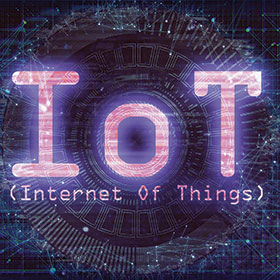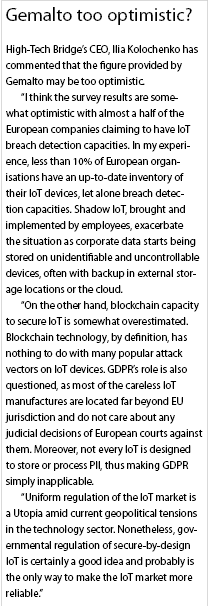

Gemalto revealed that only around half (48%) of businesses can detect if any of their IoT devices suffers a breach. This comes despite companies having an increased focus on IoT security:
• Spending on protection has grown (from 11% of IoT budget in 2017 to 13% now),
• Nearly all (90%) believing it is a big consideration for customers, and
• Almost three times as many now see IoT security as an ethical responsibility (14%), compared to a year ago (4%).
With the number of connected devices set to top 20 billion by 2023, businesses must act quickly to ensure their IoT breach detection is as effective as possible.

Surveying 950 IT and business decision makers globally, Gemalto found that companies are calling on governments to intervene, with 79% asking for more robust guidelines on IoT security, and 59% seeking clarification on who is responsible for protecting IoT. Despite the fact that many governments have already enacted or announced the introduction of regulations specific to IoT security, most (95%) of businesses believe there should be uniform regulations in place, a finding that is echoed by consumers (according to the Gemalto Connected Living in 2030 report), 95% expect IoT devices to be governed by security regulations.
“Given the increase in the number of IoT-enabled devices, it’s extremely worrying to see that businesses still can’t detect if they have been breached,” said Jason Hart, CTO, data protection at Gemalto. “With no consistent regulation guiding the industry, it’s no surprise the threats – and, in turn, vulnerability of businesses – are increasing. This will only continue unless governments step in now to help industry avoid losing control.”
With such a big task in hand, businesses are calling for governmental intervention because of the challenges they see in securing connected devices and IoT services. This is particularly mentioned for data privacy (38%) and the collection of large amounts of data (34%). Protecting an increasing amount of data is proving an issue, with only three in five (59%) of those using IoT and spending on IoT security, admitting they encrypt all of their data.
Consumers are clearly not impressed with the efforts of the IoT industry, with 62% believing security needs to improve. When it comes to the biggest areas of concern 54% fear a lack of privacy because of connected devices, followed closely by unauthorised parties like hackers controlling devices (51%) and lack of control over personal data (50%).

Blockchain gains pace as an IoT security tool
While the industry awaits regulation, it is seeking ways to address the issues itself, with blockchain emerging as a potential technology; adoption of blockchain has doubled from 9% to 19% in the last 12 months. What’s more, a quarter (23%) of respondents believe that blockchain technology would be an ideal solution to use for securing IoT devices, with 91% of organisations that don’t currently use the technology are likely to consider it in the future.
As blockchain technology finds its place in securing IoT devices, businesses continue to employ other methods to protect themselves against cybercriminals. The majority (71%) encrypt their data, while password protection (66%) and two factor authentication (38%) remain prominent.
For more information, go to https://safenet.gemalto.com/iot-2018/

© Technews Publishing (Pty) Ltd. | All Rights Reserved.